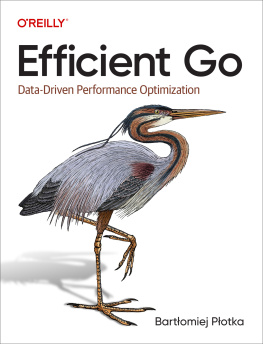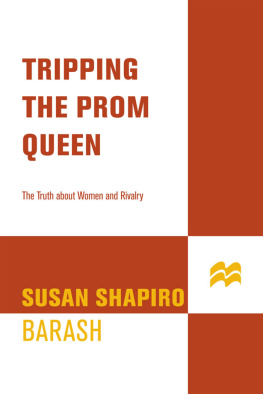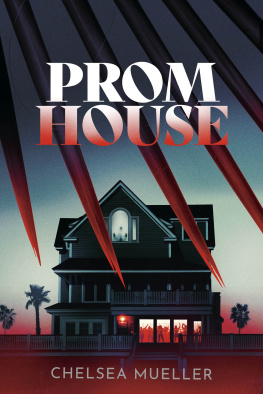Bartłomiej Płotka - Efficient Go (for lipped prom)
Here you can read online Bartłomiej Płotka - Efficient Go (for lipped prom) full text of the book (entire story) in english for free. Download pdf and epub, get meaning, cover and reviews about this ebook. year: 2022, publisher: OReilly Media, Inc., genre: Computer. Description of the work, (preface) as well as reviews are available. Best literature library LitArk.com created for fans of good reading and offers a wide selection of genres:
Romance novel
Science fiction
Adventure
Detective
Science
History
Home and family
Prose
Art
Politics
Computer
Non-fiction
Religion
Business
Children
Humor
Choose a favorite category and find really read worthwhile books. Enjoy immersion in the world of imagination, feel the emotions of the characters or learn something new for yourself, make an fascinating discovery.
- Book:Efficient Go (for lipped prom)
- Author:
- Publisher:OReilly Media, Inc.
- Genre:
- Year:2022
- Rating:4 / 5
- Favourites:Add to favourites
- Your mark:
- 80
- 1
- 2
- 3
- 4
- 5
Efficient Go (for lipped prom): summary, description and annotation
We offer to read an annotation, description, summary or preface (depends on what the author of the book "Efficient Go (for lipped prom)" wrote himself). If you haven't found the necessary information about the book — write in the comments, we will try to find it.
Efficient Go (for lipped prom) — read online for free the complete book (whole text) full work
Below is the text of the book, divided by pages. System saving the place of the last page read, allows you to conveniently read the book "Efficient Go (for lipped prom)" online for free, without having to search again every time where you left off. Put a bookmark, and you can go to the page where you finished reading at any time.
Font size:
Interval:
Bookmark:
by Bartomiej Potka
Copyright 2023 Alloc Limited. All rights reserved.
Printed in the United States of America.
Published by OReilly Media, Inc. , 1005 Gravenstein Highway North, Sebastopol, CA 95472.
OReilly books may be purchased for educational, business, or sales promotional use. Online editions are also available for most titles (http://oreilly.com). For more information, contact our corporate/institutional sales department: 800-998-9938 or corporate@oreilly.com .
Acquisitions Editors: Brian Guerin and Zan McQuade | Indexer: WordCo Indexing Services, Inc. |
Development Editor: Melissa Potter | Interior Designer: David Futato |
Production Editor: Clare Laylock | Cover Designer: Karen Montgomery |
Copyeditor: Sonia Saruba | Illustrator: Kate Dullea |
Proofreader: Piper Editorial Consulting, LLC |
- November 2022: First Edition
- 2022-11-08: First Release
See http://oreilly.com/catalog/errata.csp?isbn=9781098105716 for release details.
The OReilly logo is a registered trademark of OReilly Media, Inc. Efficient Go, the cover image, and related trade dress are trademarks of OReilly Media, Inc.
The views expressed in this work are those of the author, and do not represent the publishers views. While the publisher and the author have used good faith efforts to ensure that the information and instructions contained in this work are accurate, the publisher and the author disclaim all responsibility for errors or omissions, including without limitation responsibility for damages resulting from the use of or reliance on this work. Use of the information and instructions contained in this work is at your own risk. If any code samples or other technology this work contains or describes is subject to open source licenses or the intellectual property rights of others, it is your responsibility to ensure that your use thereof complies with such licenses and/or rights.
978-1-098-10571-6
[LSI]
Welcome to the pragmatic software development world, where engineers are not afraid of ambitious performance goals. Where the change in requirements or unexpected efficiency issues is handled without stress, where code is optimized tactically and effectively, based on data, yet the codebase is kept simple and easy to read, maintain, and extend. Wait, is this even possible?
Yes, and I will show you how! The good news is that if you bought this book, you are already halfway thereit means you acknowledge the problem and are open to learning more! The bad news is that, while I tried to distill the knowledge to only whats necessary, there are still 11 chapters to go through. I think Efficient Go is unique in this regard as it is not a quick tutorial. Instead, it is a complete guide to writing efficient yet pragmatic software that goes through all aspects I wish I had known when I started my career.
In this book, you will undoubtedly learn a lot about my favorite programming language, Go, and how to optimize it. But dont let the title of this book fool you. While I use Go as the example language to show the optimization mindset and observability patterns, 8 out of 11 chapters of this book are language agnostic. You can use the same techniques to improve software written in any other language like Java, C#, Scala, Python, C++, Rust, or Haskell.
Finally, if you expected a full list of low-level optimization tricks, this is not the right book. Firstly, optimizations do not generalize well. The fact that someone unrolled the loop or used a pointer in their struct field and achieved better efficiency does not mean it will be helpful if we do the same! We will go through some optimization tricks, but I emphasize complete knowledge about efficiency in pragmatic software development instead.
Secondly, low-level dangerous tricks are often not needed. In most cases, an awareness of simple points where your program wastes time and resources is enough to fulfill your efficiency and scalability goals cheaply and effectively. Furthermore, you will learn that in most cases, there is no need to rewrite your program to C++, Rust, or Assembly to have an efficient solution!
Before we start, lets go through the main goals behind this book and why I found it necessary to focus my time on the subject of efficiency. You will also learn how to get the most out of this book and effectively use it in your software development tasks.
I spent around 1,200 hours writing Efficient Go, so the choice to deliver such a book was not spur-of-the-moment. In the era of social media, YouTube, and TikTok, book writing and reading might feel outdated, but in my experience, modern media tend to oversimplify topics. You have to condense those to an absolute minimum not to lose viewers and monetization. It leads to the wrong incentives, which generally collide with what I wanted to achieve with this book.
My mission here is straightforward: I want the software I use or depend on to be better! I want software project contributors and maintainers to understand their codes efficiency and how to assess it. I want them to reliably review my or others pull requests with efficiency improvements. I want people around me to know how to handle performance issues professionally instead of building a stressful atmosphere. I want users and stakeholders to be cautious with the benchmarks and cheap marketing we see in the industry. Finally, I want leaders, directors, and product managers to approach software efficiency topics maturely with the awareness of how to form pragmatic efficiency requirements that help engineers to deliver excellent products.
I also consider this book a small contribution toward more sustainable software. Every wasted CPU time and memory wastes a significant amount of your businesss money. However, it also wastes energy and hardware, which has a serious environmental effect. So saving money and the planet at the same time while enabling better value for your business is not a bad outcome of the skills you will learn here.
I figured out that writing a book is the best way to achieve this goal. Its easier than continuously explaining the same nuances, tooling, and techniques in my daily work, open source, and conferences!
I built my experience toward efficiency topics and high-quality software development through a lot of practice, mistakes, experiments, implicit mentors, and research.
I was 29 years old when I started writing this book. That might not feel like much experience, but I started a full-time, professional software development career when I was 19. I did full-time computer science studies in parallel to work at Intel around software-defined infrastructure (SDI). I initially coded in Python around the OpenStack project, then in C++ including contributions to the popular-back-then Mesos project under the supervision of amazing engineers from Mesosphere and Twitter. Finally, I moved to develop Go around Kubernetes and fell in love with this language.
I spent a nontrivial amount of time at Intel on node oversubscription feature with noisy neighbor mitigations. Generally, oversubscription allows running more programs on a single machine than would be otherwise possible. This can work since statistically, all programs rarely use all of their reserved resources simultaneously. Looking at this now from a later perspective, it is usually easier and more effective to save money by starting with software optimization than by using complex algorithms like this.
Font size:
Interval:
Bookmark:
Similar books «Efficient Go (for lipped prom)»
Look at similar books to Efficient Go (for lipped prom). We have selected literature similar in name and meaning in the hope of providing readers with more options to find new, interesting, not yet read works.
Discussion, reviews of the book Efficient Go (for lipped prom) and just readers' own opinions. Leave your comments, write what you think about the work, its meaning or the main characters. Specify what exactly you liked and what you didn't like, and why you think so.










